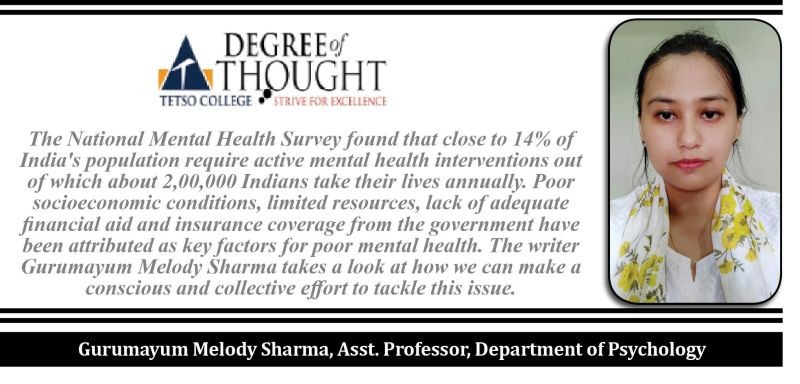
According to the World Health Organization (WHO), mental health is "a state of well being in which the individual realizes his or her own abilities, can cope with the normal stresses of life, can work productively and fruitfully, and is able to make a contribution to his or her community".
It is estimated that 6-7% of the population worldwide suffers from mental disorders. WHO estimates that about 7.5% Indians suffer from some mental disorder. India has one of the highest prevalence of mental illnesses globally. The National Mental Health Survey found that close to 14% of India's population require active mental health interventions. Every year, about 2,00,000 Indians take their lives. The statistics are even higher if one starts to include the number of attempts to suicide. Several northeastern states bear a heavier burden of mental health issues amongst their citizens than the country's central and northern states.
Throughout the world, many people with poor mental health conditions often experience severe human rights violations, discrimination, and stigma. People from certain ethnic backgrounds are still diagnosed with more serious mental disorders than the rest of the population. Mental health or ill health is, by some, thought to be inherent within the individual but there is a clear link with social justice. Social justice, as its name indicates, resides within the realm of the social but it should be clearly kept in mind that mental health is a social justice issue just as much as it is an individual healthcare issue.
The National Mental Health Survey found that mental health disorders disproportionately affect households with lower income, less education, and lower employment. Due to the socioeconomic conditions and limited resources available, people with mental health issues have been going through many difficulties. Lack of adequate financial aid and insurance coverage from the government and various agencies result in worsening the condition of the vulnerable. It is therefore very important to look into the prevailing social issue and value every person irrespective of any condition. No person should be stigmatized or discriminated against but rather should be valued and respected for their uniqueness. When dealing with an individual’s wellbeing one should be aware of their own perceptions, assumptions and prejudices particularly when making judgements and assessments of an individual’s mental health status.
Mental health issues need to be reframed as a social justice issue and not to be looked upon solely as a personal problem. Like all invisible things, difficult mental health struggles are forced to live on a threshold. It cannot be contained within the person experiencing it. It is not only the person but everyone around him who has to undergo the emotional dilemma. Even if one cannot open up directly such conditions get reflected in work, relationships and their life in general. And at present by and large one is still under the dilemma of not being able to express freely because of the stigma which can transform reality into a matter that can be questioned and ridiculed. And so it exists, neither fully hidden nor completely expressed, in a liminal space that continues to burden the person living with it.
An analysis based on gender also revealed that more women suffered from mental health issues than men. Besides, mental health is affected by gender identity, sexual orientation, caste and class location, disability, age, as well as the experience of traumatic events. Also historically, transgender people’s very identity was characterized by the medical establishment as a mental health condition. It is only recently that being trans is no longer pathologized by the World Health Organization.
Unfortunately, despite having implemented various laws, there has been violation of certain human rights. Society is still ignorant of the ongoing violations of international human rights law when it comes to the treatment of persons with mental disabilities. Despite a robust set of international law principles, standards and doctrines, and the recent ratification of the United Nations' Convention on the Rights of Persons with Disabilities, people with mental disabilities continue to live in some of the worst conditions that exist in any society. These conditions are the product of neglect, lack of legal protection against improper and abusive treatment, and social attitudes that demean, trivialize and ignore the humanity of persons with disabilities.
Hence it is very much essential and equally important for people with mental health problems to enjoy the same rights and social justice as all citizens. Every person has the right to be treated with respect and dignity and most importantly to be protected from laws; social exclusion; institutional service and treatment practices that segregate or discriminate in any form or kind. It is also highly essential that professionals, organizations and the public jointly follow this as a common practice. Immense support is greatly needed from different spheres of life as treating them with respect and dignity will enhance their feeling that they are worthwhile and are valued, useful and important as fellow human beings. This will lead to the person gaining confidence in their self worth, self respect, ability and contribution to society.
It has become high time that we address the mental health issue. Various government policies and certain individual therapy practices need to address mental health from a social justice standpoint, a feat undertaken solely by mental health advocates for now. This will allow us to improve access to health care and improve its quality — and equally, to look at the root causes of emotional distress that is stemming from injustice. The inclusion of understanding of mental health in the curriculum in every academic setting can be also a pillar of support for the upcoming generations. For individuals who are isolated and traumatized, we must make sure that they should be looked upon with proper justice and maximize their potential.
There is a strong realization that sincere and engaging dialogue and discussion be initiated to understand the need of mental health with respect to social justice. With the increasing rate of global burden of mental illness with respect to dynamic and changing realities of human existence, it is the need of the hour to address the prevailing mental health issues.
Lastly I would like to conclude by saying that “mental illness is not a personal failure”. With proper social justice and making mental healthcare more accessible, with targeted interventions for vulnerable groups without any form of stigmatization and discrimination, many would live productively and fruitfully, and will finally be able to make a contribution to his or her community.
Degree of Thought is a weekly community column initiated by Tetso College in partnership with The Morung Express. Degree of Thought will delve into the social, cultural, political and educational issues around us. The views expressed here do not reflect the opinion of the institution. Tetso College is a NAAC Accredited UGC recognised Commerce and Arts College. The editors are Dr Hewasa Lorin, Dr Aniruddha Babar, Nisha Dahiya and Meren. For feedback or comments please email: dot@tetsocollege.org






